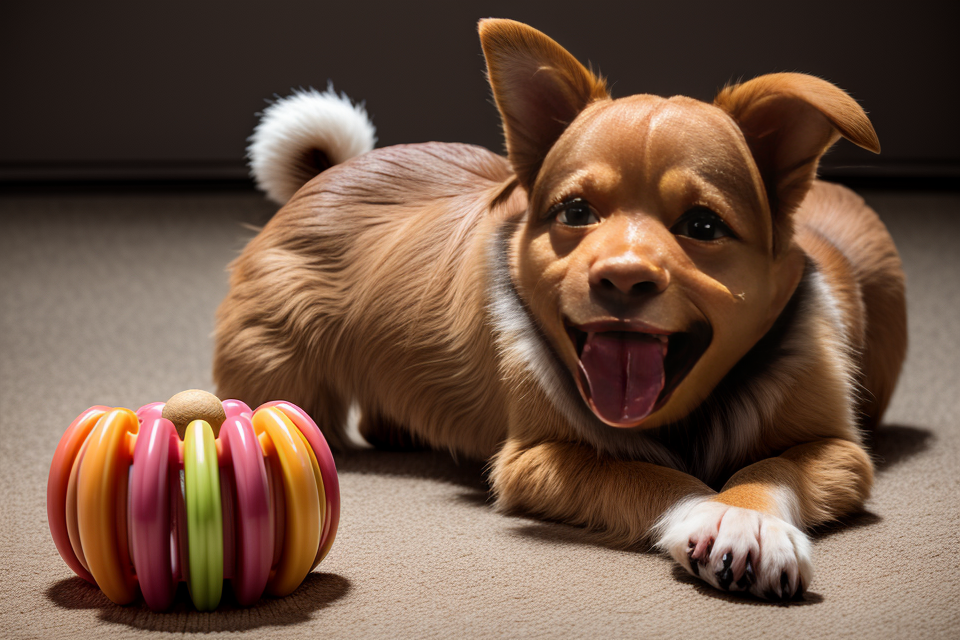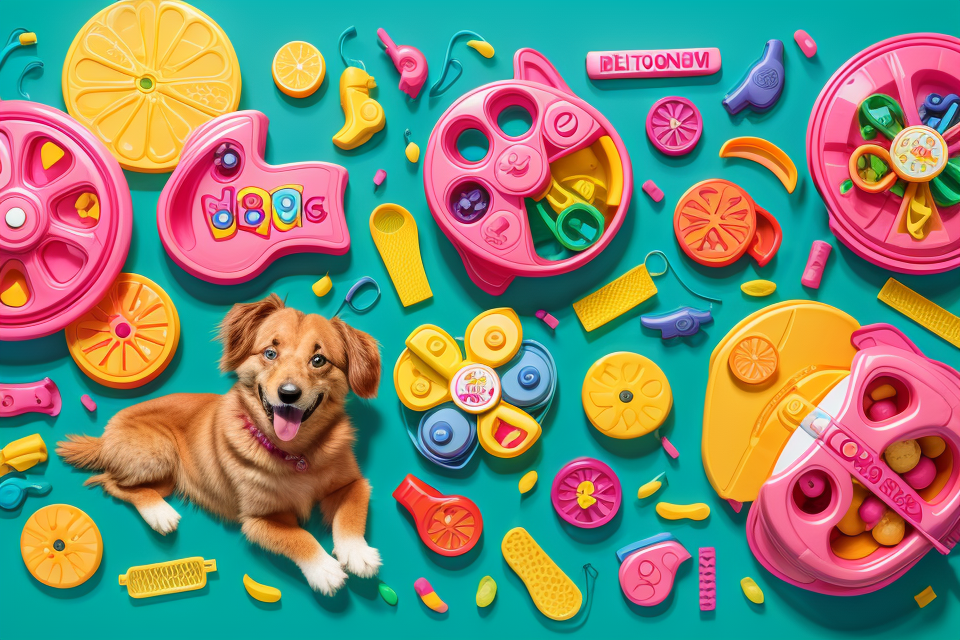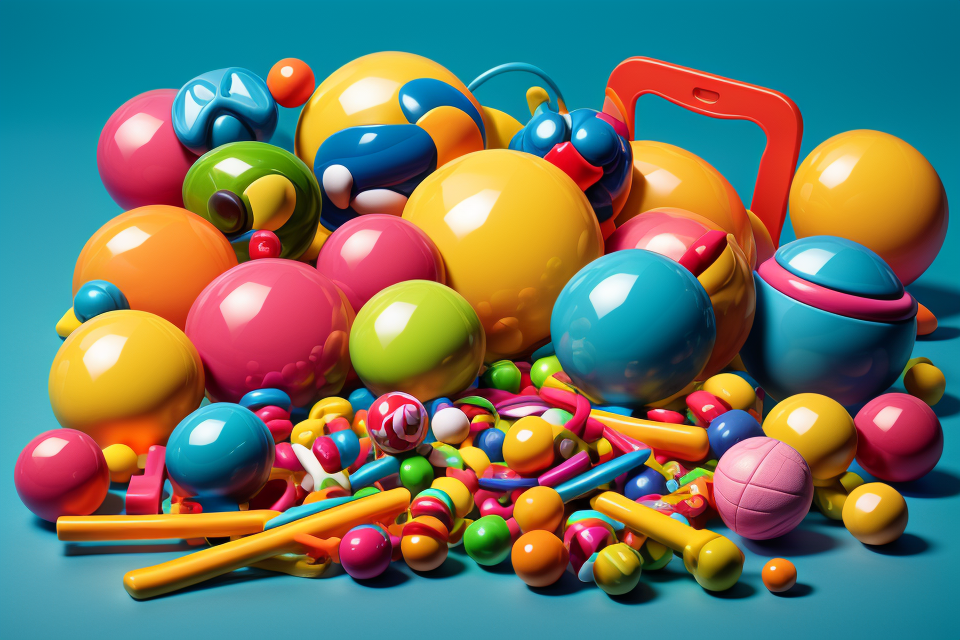Are you tired of your small pet chewing on everything in sight? As a responsible pet owner, you want to provide your furry friend with appropriate and safe chew toys that will keep them entertained and satisfied. But with so many options on the market, how do you choose the right chew toys for your pet? Fear not, as we have compiled a list of vet-recommended chew toys for small animals that will keep your pet happy and healthy. From rope toys to rubber rings, we’ve got you covered with the ultimate guide to chew toys for small animals. So, let’s dive in and explore the world of chew toys recommended by veterinarians!
Choosing the Right Chew Toys for Your Small Pet
Factors to Consider
When selecting chew toys for your small pet, there are several factors to consider to ensure that the toy is safe, durable, and appropriate for your pet’s needs. Here are some key factors to keep in mind:
- Size and shape: The size and shape of the chew toy should be appropriate for your pet’s mouth and teeth. For example, a small bird may need a toy that is designed specifically for their beak size, while a rabbit may require a toy that is large enough for them to gnaw on comfortably.
- Material: The material of the chew toy is also an important consideration. Some pets may be sensitive to certain materials, such as plastic or metal, while others may prefer natural materials like wood or rope. It’s important to choose a toy made from a material that is safe for your pet and won’t harm them if ingested.
- Durability: Durability is also an important factor to consider when choosing a chew toy for your small pet. The toy should be able to withstand your pet’s chewing and playing, while also being tough enough to last a long time. Look for toys that are made from high-quality materials and are designed to be durable and long-lasting.
- Safety: Finally, safety should always be a top priority when choosing a chew toy for your small pet. Make sure the toy is free from any small parts or pieces that could be ingested or cause choking, and avoid toys that contain harmful chemicals or materials. It’s also a good idea to supervise your pet while they play with their toys to ensure their safety.
Recommended Chew Toys for Different Small Pets
Choosing the right chew toys for your small pet is crucial to ensure their dental health and prevent them from chewing on unsafe objects. Here are some recommended chew toys for different small pets:
Rabbits
Rabbits have strong teeth and need chew toys that can withstand their biting power. Some good options include:
- Wood chew toys: Wooden chew toys are a popular choice for rabbits because they are durable and can be replaced when they become too worn.
- Rope toys: Rope toys are another great option for rabbits because they are long-lasting and can be easily replaced.
- Cardboard chew toys: Cardboard chew toys are a great option for rabbits because they are affordable and can be easily replaced.
Guinea pigs
Guinea pigs have soft teeth and need chew toys that are gentle on their teeth. Some good options include:
- Soft wood chew toys: Soft wood chew toys are a great option for guinea pigs because they are gentle on their teeth and can be easily replaced.
- Cardboard chew toys: Cardboard chew toys are a great option for guinea pigs because they are affordable and can be easily replaced.
- Silicone chew toys: Silicone chew toys are a great option for guinea pigs because they are durable and can be easily cleaned.
Hamsters
Hamsters have strong teeth and need chew toys that can withstand their biting power. Some good options include:
- Wood chew toys: Wooden chew toys are a popular choice for hamsters because they are durable and can be replaced when they become too worn.
- Rope toys: Rope toys are another great option for hamsters because they are long-lasting and can be easily replaced.
- Cardboard chew toys: Cardboard chew toys are a great option for hamsters because they are affordable and can be easily replaced.
Mice and rats
Mice and rats have strong teeth and need chew toys that can withstand their biting power. Some good options include:
- Wood chew toys: Wooden chew toys are a popular choice for mice and rats because they are durable and can be replaced when they become too worn.
- Rope toys: Rope toys are another great option for mice and rats because they are long-lasting and can be easily replaced.
- Cardboard chew toys: Cardboard chew toys are a great option for mice and rats because they are affordable and can be easily replaced.
Birds
Birds have beaks that can easily crack or break hard chew toys. Some good options include:
- Soft wood chew toys: Soft wood chew toys are a great option for birds because they are gentle on their beaks and can be easily replaced.
- Cardboard chew toys: Cardboard chew toys are a great option for birds because they are affordable and can be easily replaced.
- Silicone chew toys: Silicone chew toys are a great option for birds because they are durable and can be easily cleaned.
It is important to supervise your small pet while they are chewing on a chew toy to ensure their safety. If the chew toy becomes damaged or your pet becomes bored with it, replace it with a new one to keep them engaged.
Benefits of Chew Toys for Small Animals
Physical Health
Chew toys are essential for maintaining the physical health of small animals. Here are some benefits of chew toys for their teeth and gums, jaw strengthening, and muscle development.
Teeth and Gum Care
Small animals require regular dental care to prevent dental problems such as plaque buildup, tartar, and gum disease. Chew toys help to remove plaque and tartar from their teeth, which can help prevent these issues. Chewing also stimulates the gums, promoting blood flow and maintaining healthy gum tissue.
Jaw Strengthening
Chewing is an essential activity for small animals as it helps to strengthen their jaws and teeth. Chew toys provide a safe and healthy way for them to exercise their jaws, which can help prevent jaw problems later in life. Additionally, strong jaws are necessary for a healthy digestive system.
Muscle Development
Chewing is also an excellent way for small animals to build muscle strength. Chew toys provide resistance, which can help strengthen their jaw and neck muscles. This is particularly important for young animals, as it helps to develop their skeletal system and promote healthy growth.
In summary, chew toys are an essential part of maintaining the physical health of small animals. They help to care for their teeth and gums, strengthen their jaws, and build muscle strength, all while providing mental stimulation and reducing stress. When choosing a chew toy for your small animal, it’s essential to consider their specific needs and preferences to ensure they get the most benefit from it.
Mental Health
Chew toys provide numerous benefits for the mental health of small animals. They help stimulate the animal’s mind, reduce stress and anxiety, and provide a sense of enrichment. Here are some ways chew toys can benefit the mental health of small animals:
- Stimulation: Chew toys offer mental stimulation for small animals, keeping their minds active and engaged. They encourage animals to use their natural instincts, such as chewing and biting, which helps satisfy their innate desire to explore and interact with their environment.
- Enrichment: Chew toys provide a source of mental enrichment for small animals, helping to prevent boredom and providing variety in their daily routine. By offering a range of textures, shapes, and materials, chew toys can keep animals engaged and interested, reducing the likelihood of destructive behaviors due to understimulation.
- Reducing stress and anxiety: Chew toys can help alleviate stress and anxiety in small animals by providing a positive outlet for their energy and emotions. Animals may chew on toys when they feel anxious or stressed, and providing them with appropriate chew toys can help redirect this behavior and reduce the likelihood of destructive chewing on inappropriate items.
In summary, chew toys offer numerous benefits for the mental health of small animals, providing stimulation, enrichment, and a positive outlet for energy and emotions. By incorporating chew toys into their daily routine, pet owners can help improve the overall well-being and happiness of their small animals.
Tips for Providing Chew Toys to Your Small Pet
Rotation
Providing a variety of chew toys for your small pet is an essential aspect of maintaining their dental health and overall well-being. Rotating chew toys regularly helps to prevent boredom and repetitive chewing, which can lead to the development of harmful habits.
Here are some tips for effectively rotating chew toys for your small pet:
- Rotate regularly: To keep your pet engaged and to prevent boredom, rotate chew toys every few days. This will ensure that they always have something new to chew on and will help to prevent them from becoming fixated on one particular toy.
- Introduce new toys: Introduce new chew toys to your pet on a regular basis to keep them interested and to prevent them from becoming bored with their current selection. You can also introduce different types of chew toys, such as ropes, rubber toys, and plush toys, to provide variety and stimulation.
- Monitor your pet’s preferences: Pay attention to your pet’s preferences and monitor which chew toys they seem to enjoy the most. If they consistently show a preference for certain types of toys, you can adjust your rotation schedule accordingly to ensure that they always have access to their favorite toys.
- Consider your pet’s size and strength: When selecting chew toys for your small pet, it’s important to consider their size and strength. Smaller pets may have difficulty chewing on larger toys, while toys that are too small may pose a choking hazard. Choose toys that are appropriately sized for your pet and that are sturdy enough to withstand their chewing.
By following these tips, you can ensure that your small pet always has access to a variety of chew toys that will provide them with the stimulation and entertainment they need to stay happy and healthy.
Storage
Proper storage of chew toys is essential to ensure the safety and longevity of your small pet’s playthings. Follow these guidelines for storing chew toys:
- Keep chew toys out of reach: Store chew toys in a secure location, out of reach of your small pet when not in use. This helps prevent accidental ingestion or breakage, which can pose choking or health hazards to your pet.
- Choose a designated storage area: Dedicate a specific area in your home for storing chew toys. This can be a cabinet, shelf, or toy box. Make sure the storage area is inaccessible to your pet, but easily accessible to you for regular monitoring and cleaning.
- Inspect regularly: Regularly inspect your small pet’s chew toys for signs of wear and tear, damage, or deterioration. Discard any damaged or worn-out chew toys to prevent them from becoming a hazard.
- Rotate toys: To keep your small pet engaged and to extend the lifespan of their chew toys, consider rotating their toys on a regular basis. This means rotating in new chew toys while storing older ones for later use.
- Clean and sanitize: After each play session, clean and sanitize your small pet’s chew toys to remove any dirt, saliva, or other debris. This helps prevent the spread of bacteria and ensures that the chew toys remain safe and hygienic for your pet to continue playing with.
By following these storage tips, you can help ensure that your small pet’s chew toys remain safe, clean, and engaging for them to enjoy.
Frequently Asked Questions
How often should I replace my small pet’s chew toys?
Chew toys are an essential part of any small pet’s life as they provide mental stimulation and help satisfy their natural instinct to chew. However, it is crucial to monitor the condition of the chew toys regularly and replace them when necessary to ensure the safety and well-being of your pet. But how often should you replace your small pet’s chew toys?
Signs It’s Time to Replace Your Pet’s Chew Toy
There are several signs that indicate it’s time to replace your pet’s chew toy. Here are some of them:
- The chew toy is showing visible signs of wear and tear: If the chew toy is visibly worn out, it’s time to replace it. This is especially important for soft chew toys that can harbor bacteria and cause health issues if left too long.
- The chew toy is emitting an unpleasant odor: If the chew toy has been in use for an extended period, it may start to emit an unpleasant odor. This is a sign that it’s time to replace it and give your pet a fresh chew toy.
- Your pet is no longer interested in the chew toy: If your pet has lost interest in the chew toy, it may be time to replace it with a new one. This is especially important for pets who become bored easily and may resort to chewing on other items in the house.
The Frequency of Replacement
The frequency of replacing your pet’s chew toys depends on several factors, including the type of chew toy, the material it’s made of, and your pet’s chewing habits. However, as a general guideline, you should replace your pet’s chew toys every 1-2 weeks. This will ensure that they always have a clean and safe chew toy to keep them entertained and satisfied.
In conclusion, regularly monitoring the condition of your pet’s chew toys and replacing them when necessary is crucial for their health and well-being. By following the signs and frequency of replacement outlined above, you can provide your small pet with the best possible care and keep them happy and healthy.
Can my small pet chew on wooden or plastic toys?
While wooden and plastic toys can be appealing to small pets due to their durability and ease of use, it is important to consider the potential risks associated with these materials. In general, it is recommended that small pets avoid chewing on wooden or plastic toys as they can pose a choking hazard or cause digestive issues.
Additionally, some types of wooden and plastic materials may contain harmful chemicals or additives that can be harmful to small pets if ingested. It is important to research the materials used in any toy before allowing your pet to chew on it.
However, there are some types of wooden and plastic toys that are safe for small pets to chew on. For example, toys made from natural, untreated wood and free from harmful chemicals and additives can be a safe option. Similarly, certain types of plastic, such as those labeled as safe for pets, can be suitable for small pet chewing.
Ultimately, it is important to consult with your veterinarian to determine the best type of chew toys for your small pet based on their individual needs and any underlying health conditions.
Can my small pet chew on toys with treats inside?
Q: Can my small pet chew on toys with treats inside?
A: While many pet owners may be tempted to give their small pets toys with treats inside as a way to keep them entertained, it’s important to be aware of the potential risks associated with this type of toy. Small animals, such as rodents and rabbits, have delicate teeth and jaws that can easily become injured if they chew on hard or sharp objects. Additionally, some treats inside toys may be toxic to small pets, so it’s important to be aware of the ingredients and materials used in the toy.
Instead of giving your small pet a toy with treats inside, consider providing them with a variety of safe and appropriate chew toys made specifically for small animals. These toys are designed to be durable and long-lasting, providing your pet with the necessary chewing and biting activity they need to keep their teeth and jaws healthy.
If you do choose to give your small pet a toy with treats inside, be sure to supervise them closely and remove the toy when they are finished playing with it. It’s also important to ensure that the treats inside the toy are safe and appropriate for your pet.
Overall, while toys with treats inside may seem like a convenient option for providing your small pet with both entertainment and nourishment, it’s important to prioritize their safety and health by providing them with appropriate and safe chew toys.
Can my small pet choke on a chew toy?
While chew toys are an excellent way to keep your small pet entertained and satisfied, it’s important to understand the potential risks associated with them. One of the most common concerns is the possibility of your pet choking on a chew toy.
It’s essential to choose the right chew toy for your pet’s size and chewing habits. Some small pets, such as rabbits and guinea pigs, have delicate digestive systems and can be more prone to blockages caused by chewing on the wrong types of materials. It’s important to consult with your veterinarian to determine the best chew toys for your specific pet’s needs.
In addition, it’s crucial to supervise your pet while they are chewing on a toy. Keep an eye on them to ensure they are not trying to swallow large pieces of the toy, which could cause choking or blockages. If you notice your pet struggling while chewing, take the toy away and try again later when your pet is more relaxed.
It’s also important to avoid giving your pet any toys made from harmful materials, such as lead or certain plastics, which can be toxic if ingested. Look for chew toys made from safe, non-toxic materials that are specifically designed for small animals.
By following these guidelines and consulting with your veterinarian, you can help ensure that your small pet stays safe and healthy while enjoying their favorite chew toys.
Are there any homemade chew toys safe for my small pet?
When it comes to providing chew toys for your small pet, it’s important to ensure that the toys are safe and appropriate for their size and chewing habits. While store-bought chew toys are a convenient option, some pet owners may prefer to make their own homemade chew toys for their pets. However, it’s important to note that not all homemade chew toys are safe for small animals.
It’s important to consult with your veterinarian before making any homemade chew toys for your small pet. Your veterinarian can provide guidance on what materials are safe for your pet to chew on and what materials should be avoided. Some materials, such as rawhide or raw meat, can be dangerous for small pets and should be avoided.
Additionally, it’s important to consider the size and shape of the homemade chew toy. Small pets, such as rodents and rabbits, can easily choke on large pieces of wood or other materials. It’s important to choose materials that are small enough for your pet to safely chew on and swallow without choking.
In summary, while homemade chew toys can be a fun and creative option for small pets, it’s important to consult with your veterinarian before making any homemade chew toys. Your veterinarian can provide guidance on safe materials and sizes for your pet’s chew toys, ensuring that they are safe and appropriate for your small pet’s unique needs.
FAQs
1. What are chew toys, and why are they important for small animals?
Chew toys are specially designed toys that are safe for small animals to chew on. They are made from a variety of materials, such as rubber, nylon, and rope, and are designed to help satisfy an animal’s natural instinct to chew. Chew toys are important for small animals because they provide mental stimulation and help keep their teeth and gums healthy by reducing the buildup of plaque and tartar.
2. What types of chew toys are available for small animals?
There are many different types of chew toys available for small animals, including rubber rings, nylon bones, rope toys, and interactive puzzle toys. Some chew toys are designed for specific small animals, such as rabbits or guinea pigs, and may have features that are specific to their needs. When choosing a chew toy for your small animal, it’s important to consider their size, strength, and chewing habits.
3. How do I choose the right chew toy for my small animal?
When choosing a chew toy for your small animal, it’s important to consider their size, strength, and chewing habits. You should also consider the material the chew toy is made from, as some materials may be more appropriate for certain types of small animals. It’s a good idea to consult with your veterinarian or a knowledgeable pet store employee to help you choose the right chew toy for your small animal.
4. How long can my small animal use a chew toy before it needs to be replaced?
The lifespan of a chew toy will depend on the material it is made from and how often your small animal uses it. Some chew toys may need to be replaced every few weeks, while others may last for several months. It’s important to monitor the condition of your small animal’s chew toys and replace them when they become worn or damaged.
5. Are there any risks associated with giving my small animal a chew toy?
While chew toys are generally safe for small animals, there are some risks to be aware of. Chew toys that are too small can be swallowed and cause blockages, while chew toys that are too large can be difficult for small animals to chew on and may cause them to lose interest in the toy. It’s important to supervise your small animal when they are using a chew toy and to choose a toy that is appropriate for their size and chewing habits.



